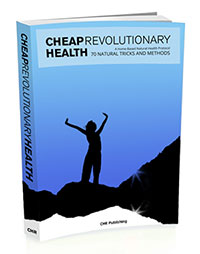Copper Toxicity
Later note: It is reported that zinc deficiency can cause copper to not be utilised properly. At the same time, excess zinc can cause you to become copper deficient, which is a problem that has been linked to anxiety, hyperthyroidism, cardiovascular disease, multiple sclerosis and other problems. A correct balance between copper and zinc is therefore crucial.
It has been mentioned that copper is an ancient beauty mineral and prevents wrinkling. The colloidal form of copper is recommended by some. But what I am currently concerned with is getting the bad kind of copper out of my tissues, as adviced by the ARL Labs' hair mineral analysis & Dr. Lawrence Wilson's Nutritional Balancing Program. The bad kind of copper is copper that has not been properly utilized by the body, and thus it ends up collecting in the wrong places. The bad copper can act like free radicals, oxidising and damaging tissue.
ARL Labs and/ or Dr. Lawrence Wilson report:
- Copper toxicity is one of the most common imbalances found in hair mineral analysis today.
- Copper toxicity can cause: fatigue, PMS, anorexia, depression, anxiety, migraines, allergies, etc.
- [Bad] copper interferes with adrenal and thyroid gland activity and is thus related to adrenal insufficiency and hypothyroidism.
- "Diminished adrenal activity is perhaps the single most important physiological reason for copper problems today."
- Unused copper accumulates in the liver, brain, heart, kidneys and bone, as well as other organs and tissues of the body.
- Zinc is needed to prevent copper from collecting in the tissues. Almost the entire American population is borderline zinc deficient. Zinc deficiency can be caused by: stress, high sugar and carb diet, low levels of zinc in the soil where vegetables are grown (a typical problem today), and refining of foods (destroys zinc). Also many children are born zinc-deficient because their mothers are deficient.
- Birth control pills are a major contributor to copper toxicity, as are supplements, fungicides for swimming pools and foods, copper water pipes, copper cookware, and any other ways of coming into contact with copper.
- Excessive lowering of copper levels can result in anxiety or other symptoms.
- Copper is excreted mainly through the bile.
- Vitamin C binds or chelates copper and facilitates its removal.
- Zinc and manganese displace copper from the liver.
- Molybdenum (another mineral) and sulfur bind to copper and greatly facilitate its excretion.
- Copper detox symptoms may include: headache, skin rash, free-floating anxiety, insomnia, fatigue, testicular pain, changes in menstrual cycle, emotional sensitivity, weepiness, irritability and flare-up of chronic conditions related to copper imbalance. These symptoms generally last a day or two and then subside.
Later note: Note that in my case many of the so-called copper detox symptoms lasted three years, until I realized to start supplementing with copper and to stay away from zinc supplements.
Dr. Wilson also warns against eating too much wheat, because it can be high in copper, cause inflammation due to its glutamine content, and be low in zinc. Inflammation, in turn, can deplete zinc from the body. (1)
Copper Detoxification Happening Fast
My third and fourth hair mineral analysis reports showed elevated copper levels, indicating that toxic copper was being released from tissues. My adrenal glands had strengthened at the same time, as reported here, which is the most likely reason for the beginning of copper detox. Sluggish adrenal glands usually means that the body does not have the strength to push out many toxins, including copper.

My copper detoxification started showing in my third mineral analysis, and has since slowed down, which the nutritionist thinks is a good sign.
I started experiencing anxiety around the time of my second test. Keep in mind, however, that each test shows an average accumulation of minerals from the three months prior to the test. Also, there is usually a 3-4 week delay before I get the test results, and the dates shown on the test result chart indicate the dates when I got my test results back.
The anxiety symptoms really started to show and bother me in July 2013, at which point the beginning of copper detox may have started. Then the anxiety got much worse, and in a lot later test three possible anxiety markers were shown: overactive adrenal glands, faster metabolism, and copper detoxifying. Anxiety can apparently be experienced by slow oxidisers when their metabolism speeds up suddenly, which was my case. So I am not sure whether the anxiety was a side effect of eliminating toxic copper, or whether it was a combination of many things.
Much later I started getting headaches, which could have been linked either to copper elimination or to some supplements I was taking.
Later note: My anxiety (and hyperthyroid) symptoms started when copper started to be excreted from my body. After suffering from this for three years I started to supplement with copper which seemed to help very quickly and the symptoms began to be eliminated. Therefore I came to believe that the anxiety was caused by deficiency of nutritious (bound) copper and not by detoxification of toxic (free) copper. I have explained why I came to believe this in more detail here.
Later note: After much experimentation I managed to eliminate my headaches, which were linked to a chronic sinus infection (sinus headaches), made worse by anything cold, including cold foods, as well as stress (tension headaches) and neck tension. Further notes on the headaches here.
Zinc and Copper
Dr. Lawrence Wilson states in his book: Nutritional Balancing and Hair Mineral Analysis (1) that "everyone has zinc and copper imbalance today" (1). The reasons for this, he states, are:
- Most parents are deficient in zinc and copper and pass it onto their children
- Stress depletes zinc and copper
- Adrenal fatigue causes toxic copper accumulation
- Zinc is low in soil and hybrid crops today
- Food refining tends to remove more zinc than copper
- Impaired digestion reduces utilization of nutrients
- Vegetarian diets tend to reduce zinc intake and increase copper intake
- Some high-copper foods, such as dark chocolate, avocados, nuts and tea are eaten in large quantities
- Copper exposure from birth-control devices and pills
Zinc and copper are 'twin' minerals because they influence each other. The goal should thus be to balance both minerals simultaneously.
Zinc can act as a calming neurotransmitter and is one of the 'sedative' minerals, with calcium and magnesium. Zinc is also a powerful antioxidant nutrient, whereas copper can act as an oxidant nutrient. Zinc appears to activate the frontal lobes of the brain, the so-called 'new brain' (1).
Later notes:
- Copper in bad form can act as an oxidant, but in good form is an antioxidant.
- It is contradictory that Dr. Lawrence Wilson himself differentiates between good and bad forms of copper, according to how well the body can utilise them, yet simultaneously advices against natural sources of good copper, which are available from foods.
- Excess zinc can, according to other reports, stop the body from utilising copper correctly, therefore potentially resulting in toxic copper floating around the body. Is it possible that my symptoms, which were branded 'copper detox', were in fact symptoms of copper toxicity, and a result of zinc hindering with copper's proper utilisation?
Later note: The fight between copper and zinc as the 'good nutrient' is to some degree a fight between the proponents of vegetarian and meat-eater diets. Much copper is available from nuts, seeds, soya, and avocado, whereas much zinc is available from animal-based products. Some proponents of zinc use it to argue against vegetarianism (including Dr. Wilson), stating that vegetarian diets result in copper toxicity. Proponents of copper, on the other hand, sometimes note that excess zinc may result from consumption of excess animal products. Please try to see through such attempts and do not make your decision based on your dietary beliefs! The balance between zinc and copper is a complex issue, and in my view the best approach is to carefully study these minerals, as well as their deficiency and toxicity symptoms, and experiment very carefully with each to see how you feel. To be completely safe, a doctor well versed in these topics should be consulted with, but it may be difficult to find one, and therefore many of us are left with the less safe option of experimenting on ourselves.
Be careful with supplements, however. Use high-quality supplements and study their synergies with other supplements, before taking. Some supplements have to be combined with other nutrients before they work, whereas certain nutrient supplements (even foods) may have to be discontinued at the same time.
Copper Toxicity Symptoms
An elevated copper level in the hair mineral analysis can produce different symptoms depending on where the copper is lodged in the body. Excess copper is usually in biounavailable form and can cause inflammation and sometimes serious oxidative damage. Copper toxicity symptoms may include: inflammation, pain, menstrual problems, testicular pain, cancers, allergies, brain fog, emotional and mental illness, thyroid and liver disorders, etc. (1)
Copper and the Nervous System
"Dr. Eck called copper the 'emotional' or 'love' mineral because it has such as profound impact upon the central nervous system. The psychiatric implications of copper imbalance are tremendous. Most psychological and psychiatric conditions improve when copper is brought into better balance in the body.
"The overall effect of excess and biounavailable copper appears to be to increase most emotional activity in a human being, while zinc tends to balance the emotions. Dr. Eck read that copper stimulates the diencephalon, also called the 'old' or 'animal' brain. This can enhance a tendency for most emotional conditions, from depression and anxieties to autism, ADD, ADHD, brain fog, insomnia, epilepsy, fears, phobias, loss of concentration, aggression, violence, obsessive-compulsive behavior, bipolar tendencies, Tourette's syndrome and some schizophrenias. [...] These are so common and respond so well to nutritional balancing science it is a wonder more doctors are not aware of the importance of copper in mental illness."
- Dr. Wilson (1)
Dr Wilson also cites some research studies in his book, which seems to indicate that higher copper levels correlate with more violent tendencies.
Important note: Problems caused by toxic copper relate specifically to toxicity of the bad form of copper - not to properly bound and utilised nutrient copper (i.e. 'good' copper).
Read also: Brain Allergies.
Sources
(1) Dr. Lawrence Wilson: Nutritional Balancing and Hair Mineral Analysis: A New Science of Energy (2020)
(2) My Hair Mineral Analysis Report by ARL Labs
Dr Lawrence Wilson's book provides plenty of information on copper toxicity most of which is beyond the scope of this article.
Continue reading....
Fifth 'Hair Mineral Analysis' test results, April 2015, Critical Review
Adrenal Insufficiency
Brain Allergies
Benefits of Being Gluten Free
Hair Mineral Analysis (HTMA) - Introduction
Third HTMA test report summary
Hyperthyroidism Caused by Copper Deficiency?
We Recommend
Latest Articles
Most Popular Articles
Collection of Best Raw Food Articles
Juice Fasting Articles
Book Summaries
Natural Remedy Library A-Z

Edition 3.0: Cheap Revolutionary Health Ebook: 68 Natural Tricks and Methods - The Amazing Power of Small Everyday Tasks
To be safe, please consult your health-care provider before attempting self-treatment for health issues.
Navigation
Home Latest Articles Conditions A-Z Raw Food Juice Fasting Recipes My Health Journey Best ArticlesGet in Touch:
Contact Us Instagram: "Good Life Meals"About CHR:

Ulla is the Editor of Cheap Health Revolution, covering natural remedies and health solutions. Read more about Ulla and this website here: "About CHR"









